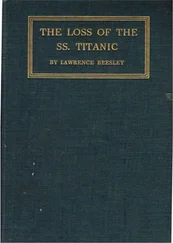John Byron - Byron's Narrative of the Loss of the Wager
Здесь есть возможность читать онлайн «John Byron - Byron's Narrative of the Loss of the Wager» — ознакомительный отрывок электронной книги совершенно бесплатно, а после прочтения отрывка купить полную версию. В некоторых случаях можно слушать аудио, скачать через торрент в формате fb2 и присутствует краткое содержание. Издательство: Иностранный паблик, Жанр: foreign_antique, foreign_prose, на английском языке. Описание произведения, (предисловие) а так же отзывы посетителей доступны на портале библиотеки ЛибКат.
- Название:Byron's Narrative of the Loss of the Wager
- Автор:
- Издательство:Иностранный паблик
- Жанр:
- Год:неизвестен
- ISBN:нет данных
- Рейтинг книги:3 / 5. Голосов: 1
-
Избранное:Добавить в избранное
- Отзывы:
-
Ваша оценка:
- 60
- 1
- 2
- 3
- 4
- 5
Byron's Narrative of the Loss of the Wager: краткое содержание, описание и аннотация
Предлагаем к чтению аннотацию, описание, краткое содержание или предисловие (зависит от того, что написал сам автор книги «Byron's Narrative of the Loss of the Wager»). Если вы не нашли необходимую информацию о книге — напишите в комментариях, мы постараемся отыскать её.
Byron's Narrative of the Loss of the Wager — читать онлайн ознакомительный отрывок
Ниже представлен текст книги, разбитый по страницам. Система сохранения места последней прочитанной страницы, позволяет с удобством читать онлайн бесплатно книгу «Byron's Narrative of the Loss of the Wager», без необходимости каждый раз заново искать на чём Вы остановились. Поставьте закладку, и сможете в любой момент перейти на страницу, на которой закончили чтение.
Интервал:
Закладка:
Thus shattered and disabled, a single ship, (for we had now lost sight of our squadron) we had the additional mortification to find ourselves bearing for the land on a lee shore, having thus far persevered in the course we held, from an error in conjecture; for the weather was unfavourable for observation, and there are no charts of that part of the coast. When those officers who first perceived their mistake, endeavoured to persuade the captain to alter his course, and bear away, for the greater surety, to the westward, he persisted in making directly, as he thought, for the island of Socoro; and to such as dared from time to time to deliver their doubts of being entangled with the land stretching to the westward, he replied, that he thought himself in no case at liberty to deviate from his orders; and that the absence of his ship from the first place of rendezvous, would entirely frustrate the whole squadron in the first object of their attack, and possibly decide upon the fortune of the whole expedition. For the better understanding the force of his reasoning, it is necessary to explain, that the island of Socoro is in the neighbourhood of Baldivia, the capture of which place could not be effected without the junction of that ship, which carried the ordnance and military stores.
The knowledge of the great importance of giving so early and unexpected a blow to the Spaniards, determined the captain to make the shortest way to the point in view; and that rigid adherence to orders from which he thought himself in no case at liberty to depart, begot in him a stubborn defiance of all difficulties, and took away from him those apprehensions, which so justly alarmed all such as, from an ignorance of the orders, had nothing present to their minds but the dangers of a lee shore. 3 3 Captain Cheap has been suspected of a design of going on the Spanish coast without the Commodore; but no part of his conduct seems to authorise, in the least, such a suspicion. The author who brings this heavy charge against him, is equally mistaken in imagining that Captain Cheap had not instructions to sail to this island, and that the Commodore did neither go nor send thither, to inform himself if any of the squadron were there. This appears from the orders delivered to the captains of the squadron, the day before they sailed from St. Catherine's (L. Anson's Voyage, B.I.C. 6.); from the orders of the council of war held on board the Centurion, in the bay of St. Julian, (C. 7.); and from the conduct of the Commodore (C. 10.) who cruized (with the utmost hazard) more than a fortnight off the isle of Socoro, and along the coast in its neighbourhood. It was the second rendezvous at Baldivia, and not that at Socoro, that the Commodore was forced by necessity to neglect.
We had for some time been sensible of our approach to the land, from no other tokens than those of weeds and birds, which are the usual indications of nearing the coast; but at length we had an imperfect view of an eminence, which we conjectured to be one of the mountains of the Cordilleras. This, however, was not so distinctly seen but that many conceived it to be the effect of imagination: but if the captain was persuaded of the nearness of our danger, it was now too late to remedy it; for at this time the straps of the fore jeer blocks breaking, the fore-yard came down; and the greatest part of the men being disabled through fatigue and sickness, it was some time before it could be got up again. The few hands who were employed in this business now plainly saw the land on the larboard beam, bearing N.W., upon which the ship was driving bodily. Orders were then given immediately by the captain to sway the fore-yard up, and set the fore-sail; which done, we wore ship with her head to the southward, and endeavoured to crowd her off from the land: but the weather, from being exceedingly tempestuous, blowing now a perfect hurricane, and right in upon the shore, rendered our endeavours (for we were now only twelve hands fit for duty) entirely fruitless. The night came on, dreadful beyond description, in which, attempting to throw out our topsails to claw off the shore, they were immediately blown from the yards.
In the morning, about four o'clock, the ship struck. The shock we received upon this occasion, though very great, being not unlike the blow of a heavy sea, such as in the series of preceding storms we had often experienced, was taken for the same; but we were soon undeceived by her striking again more violently than before, which laid her upon her beam ends, the sea making a fair breach over her. Every person that now could stir was presently upon the quarter-deck; and many even of those were alert upon this occasion, that had not showed their faces upon deck for above two months before: several poor wretches, who were in the last stage of the scurvy, and who could not get out of their hammocks, were immediately drowned.
In this dreadful situation she lay for some little time, every soul on board looking upon the present minute as his last; for there was nothing; to be seen but breakers all around us. However, a mountainous sea hove her off from thence, but she presently struck again, and broke her tiller. In this terrifying and critical juncture, to have observed all the various modes of horror operating according to the several characters and complexions amongst us, it was necessary that the observer himself should have been free from all impressions of danger. Instances there were, however, of behaviour so very remarkable, they could not escape the notice of any one who was not entirely bereaved of his senses; for some were in this condition to all intents and purposes; particularly one, in the ravings of despair brought upon him, was seen stalking about the deck, flourishing a cutlass over his head and calling himself king of the country, and striking every body he came near, till his companions, seeing no other security against his tyranny, knocked him down. Some, reduced before by long sickness and the scurvy, became on this occasion as it were petrified and bereaved of all sense, like inanimate logs, and were bandied to and fro by the jerks and rolls of the ship, without exerting any efforts to help themselves. So terrible was the scene of foaming breakers around us, that one of the bravest men we had could not help expressing his dismay at it, saying it was too shocking a sight to bear; and would have thrown himself over the rails of the quarter-deck into the sea, had he not been prevented: but at the same time there were not wanting those who preserved a presence of mind truly heroic. The man at the helm, though both rudder and tiller were gone, kept his station; and being asked by one of the officers, if the ship would steer or not, first took his time to make trial by the wheel, and then answered with as much respect and coolness as if the ship had been in the greatest safety; and immediately after applied himself with his usual serenity to his duty, persuaded it did not become him to desert it as long as the ship kept together. Mr. Jones, mate, who now survives not only this wreck, but that of the Litchfield man of war upon the coast of Barbary, at the time when the ship was in the most imminent danger, not only shewed himself undaunted, but endeavoured to inspire the same resolution in the men; saying, "My friends, let us not be discouraged: did you never see a ship amongst breakers before? Let us try to push her through them. Come, lend a hand; here is a sheet, and here is a brace; lay hold; I don't doubt but we may stick her yet near enough to the land to save our lives." This had so good an effect, that many who before were half dead, seemed active again, and now went to work in earnest. This Mr. Jones did purely to keep up the spirits of the people as long as possible; for he often said afterwards, he thought there was not the least chance of a single man being saved. We now ran in between an opening of the breakers, steering by the sheets and braces, when providentially we stuck fast between two great rocks; that to windward sheltering us in some measure from the violence of the sea. We immediately cut away the main and foremast; but the ship kept beating in such a manner, that we imagined she could hold together but a very little while. The day now broke, and the weather, that had been extremely thick, cleared away for a few moments, and gave us a glimpse of the land not far from us. We now thought of nothing but saving our lives. To get the boats out, as our masts were gone, was a work of some time; which when accomplished, many were ready to jump into the first, by which means they narrowly escaped perishing before they reached the shore. I now went to Captain Cheap (who had the misfortune to dislocate his shoulder by a fall the day before, as he was going forward to get the fore-yard swayed up), and asked him if he would not go on shore; but he told me, as he had done before, that he would be the last to leave the ship; and he ordered me to assist in getting the men out as soon as possible. I had been with him very often from the time the ship first struck, as he desired I would, to acquaint him with every thing that passed; and I particularly remarked, that he gave his orders at that time with as much coolness as ever he had done during the former part of the voyage.
Читать дальшеИнтервал:
Закладка:
Похожие книги на «Byron's Narrative of the Loss of the Wager»
Представляем Вашему вниманию похожие книги на «Byron's Narrative of the Loss of the Wager» списком для выбора. Мы отобрали схожую по названию и смыслу литературу в надежде предоставить читателям больше вариантов отыскать новые, интересные, ещё непрочитанные произведения.
Обсуждение, отзывы о книге «Byron's Narrative of the Loss of the Wager» и просто собственные мнения читателей. Оставьте ваши комментарии, напишите, что Вы думаете о произведении, его смысле или главных героях. Укажите что конкретно понравилось, а что нет, и почему Вы так считаете.












